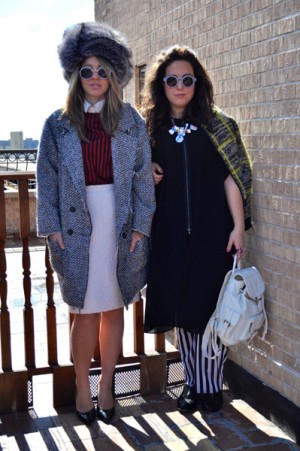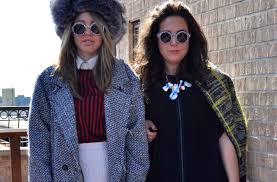
I saw it myself both while growing up in the Modern Orthodox world, and while living (although on the West Indian side) in Crown Heights over the summer. Even the sweltering heat didn’t stop the baby-laden mothers all around me from showing off their very finest duds. Long floral cotton dresses, chunky wedge (toe-covering) sandals, huge sunglasses, printed head scarves, gold bangles. I often felt under-dressed in their presence (and not because my elbows were showing).
I’m not the only one who has noticed: Fashionista.com, a real-world style and beauty website, just ran a spotlight on, believe it or not, Orthodox women’s fashions. The title of the article? “Orthodox Jewish Women Find New Way To Be Fashionable In Crown Heights.” After a brief run-down of Tzniut (modesty) Laws for Dummies, the article discusses the plight of fashion within the confines and restrictions of Orthodox Judaism. The women interviewed are mainly fashion entrepreneurs: Orthodox women who run side businesses, consignment shops, and designer brands that bring fashionable modest clothing to religious consumers. As one of the women, who opened a consignment shop called Frock Swap, in the article explains:
“Our lives were always focused around fashion and shopping and how to figure out ways to dress, look good and involve our style while not compromising on modesty,” says Polonsky. “We are appealing to the everyday Orthodox girl that loves fashion, to the girl that loves waiting for the next Vogue edition.”
The article then interviews two sisters that began a line of modest skirts called MIMU MAXI. The author noted the “ombre-styled” shetil that one of the sisters was wearing, as well as the ankle-length leopard skirt that the other had on. They are simultaneously approved because their aesthetics “would fit into any street style blog.” The sisters described their fashion impulses as a form of “Jewish creativity,” stating that “being creative is so much a part of being Orthodox: all of the foods, all of the festivals we have–you might as well get dressed up for them.”
While I went into this somewhat trite article with the expectation that I would be irked by it (fashion “journalism” does that to me), I was surprised by how annoyed I was. Annoyed to the point of cringing. Let me explain: As someone who was never “Orthodox” enough, no matter how pure my intentions or how long my study sessions lasted, I am disheartened to hear Orthodox women talk about clothing in such a reverent way. Equating Jewish festivals with designer clothes? Talking about appealing to the Jewish girls who can’t wait for Vogue to appear in their mailbox? It feels more than a little hypocritical to judge me about my bare knees (which is a hostility I felt repeatedly throughout the summer — when I would sit down on subway cars, Orthodox women would shift over slightly, as though my mere presence was enough of a contaminating force), revere yourself as a Jewish anachronism, and also describe yourself as “an everyday Orthodox girl that loves fashion! (giggle giggle)”.
Additionally, fashion is not an innocent form of “Jewish creativity.” It is quite contradictory that a person, on the one hand, does mitzvot and prays for the messiah, but on the other hand valiantly supports an industry that is contingent upon labor abuse, inequality, and materialistic consumption. The people who make the clothes that we wear are more often than not underpaid, the labor is outsourced to countries who are forced into cycles of underdevelopment, and fashion itself is a form of buying and selling of material goods that is created through systems of reinforced inequality.
I am not arguing that Orthodox women should take no pleasure in their appearance, I’m merely wondering out loud how this makes sense, according to the very laws they set for themselves and others. One would hope that the forms of Judaism that see themselves as most “authentic” to a primordial state of Jewish purity, would see the melding of Judaism and fashion as, well, problematic. What the people quoted in this article, as well as my own witness (and the myriads of articles that talk about the rampant eating disorders, girl-fighting, domestic abuse etc. among women in Orthodox communities), illustrates is that Ultra-Orthodox Jews are clearly not outside the mainstream. They, too, are imbricated in American ideologies of beauty, value, and superficiality. When I learned tzniot (modesty) laws growing up, I was taught that they had as much to do with cultivating internal self esteem as they did with “protecting” men from having lustful thoughts about my body. It is disheartening to see how the laws of tzniot are being stripped to their bare minimum (cover your knees or else you aren’t holy!) and warped to fit in with the surrounding culture of chic narcissism. It appears to me that Orthodoxy that labels itself as somehow different from modernity (read: most) is overdue for a self examination.

